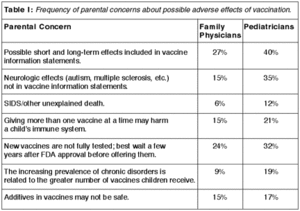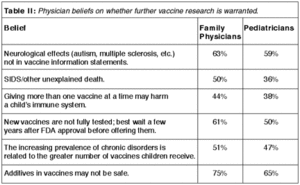A team of investigators at the University of Michigan attempted to assess how members of the medical profession (and the parents of their pediatric patients) feel about vaccines, by mailing a survey to a national random sample of 750 pediatricians and 750 family practice physicians. The survey was designed to address parental concerns about vaccine safety, how often primary care physicians do not recommend vaccines, and the impact of recent vaccine problems on physicians and parents. The results of the survey, presented at the joint meeting of the Pediatric Academic Societies and the American Academy of Pediatrics in Baltimore, Maryland this past April, show that many parents - and even some physicians - are becoming increasingly concerned about the safety of childhood vaccinations.
Parental Concerns
Seventy percent of respondents reported parents being more concerned about the safety of vaccines than in the previous year. Ninety-two percent of pediatricians (PDs) and 60 percent of family practitioners (FPs) reported at least one parental vaccine refusal.
Many practitioners also reported that the parents of patients expressed a wide variety of concerns about vaccine safety. The most common parental concern was about possible side-effects mentioned in vaccine information statements (reported by 40 percent of pediatricians and 27 percent of family practitioners), followed by the belief that new vaccines are not adequately tested (reported by 32 percent of pediatricians and 24 percent of family physicians), and that vaccines may cause neurologic disorders such as autism and multiple sclerosis (35 percent of pediatricians and 15 percent of family practitioners). A significant percentage of parents also expressed the belief that additives in vaccines may not be safe, and that they may be linked to chronic disorders or sudden infant death syndrome (SIDS).
Parental concerns appeared to have an effect on how physicans viewed vaccine research. Seventy-five percent of family physicians and 65 percent of pediatricians thought further research into the safety of vaccine additives was warranted; 63 percent of FPs and 59 percent of PDs believed there should be more study into possible links between vaccines and autism; and 44 percent of family physicians and 38 percent of pediatricians believed in conducting research into the safety of delivering multiple vaccines at the same time.
Non-Recommendation of Vaccines
Of the 743 practitioners who administered childhood vaccinations, 185 - nearly 25 percent - either occasionally or routinely did not recommend one or more vaccines. Family physicians were nearly three times as likely to not recommend a vaccine as pediatricians. The most commonly non-recommended vaccine was for chicken pox; 140 practitioners routinely or occasionally did not recommend it, followed by the vaccines for hepatitis B (29 practitioners) and diptheria/tetanus/pertussis (11 practitioners).
Physicians who occasionally did not recommend vaccines reported much greater levels of parental concern about vaccine safety than physicians who recommended all vaccines. Parental concerns about pain due to multiple injections (40.7 percent), the effect of vaccines on the immune system (22.0 percent), and the overall need for vaccines (16.1 percent) were noted consistently more frequently among physicians who sometimes did not recommend a vaccine, compared to those who recommended all vaccines (6.6, 2.5, and 1.4 percent, respectively).
Vaccine Problems and Concerns
In July of 1999, there were two significant changes in the childhood vaccination program in the U.S. : the removal of the rotavirus vaccine, and changes to the hepatitis B vaccination schedule because of a possible risk associated with thimerosal. These changes have appeared to cause considerable consternation among parents and practitioners; 35 percent of physicians said the rotavirus incident had increased their own concern about childhood vaccines, while 17 percent said that questions surrounding thimerosal had raised similar concerns. Parental concerns increased 23 percent for both the rotavirus and thimerosal controversies.
In addition, physicians who reported increased parent concern due to thimerosal were more likely to believe that further research on vaccine additives was warranted. Meanwhile, physicians who reported an increase in their own concerns - whether for rotavirus or thimerosal - were more likely to think that more research is needed on a wide variety of vaccine issues.
"Concerns regarding vaccine safety are increasing, and physicians need to be aware of this concern and be knowledgeable about the facts," said Dr. Gary Freed, a professor of pediatrics at the University of Michigan Medial School and one of the survey's co-authors.
Dr. Freed and his colleagues recommended that physicians should give parents vaccine information statements to help them better understand the risks and side-effects of vaccines. They also cautioned that health practitioners need to be sensitive to parent concerns that may not be included in vaccine literature, and that they must educate themselves about the information available.
Despite the survey findings, Dr. Freed averred that vaccines "prevent more disease in the U.S. than any other health intervention." He also asserted that "the risk of the diseases prevented by vaccination far outweighs any risk from any vaccine."
While there is little room for argument with Dr. Freed's first statement, the results of the Michigan survey show that many parents and practitioners may have a hard time agreeing with his second contention.
References
- Clark SJ, Hibbs B, Santoli J, Freed G. Impact of recent vaccine safety problems on physician and parent concerns. Presented at the annual meeting of the Pediatric Academic Societies and the American Academy of Pediatrics, Baltimore, MD, April 28-May 1, 2001.
- Freed G, Clark SJ, Hibbs B, Santoli J. Vaccine safety issues: experiences of pediatricians and family physicians. Presented at the annual meeting of the Pediatric Academic Societies and the American Academy of Pediatrics, Baltimore, MD, April 28-May 1, 2001.
- Clark SJ, Santoli J, Hibbs B, Freed G. Non-recommendation of vaccines by primary care physicians. Presented at the annual meeting of the Pediatric Academic Societies and the American Academy of Pediatrics, Baltimore, MD, April 28-May 1, 2001.
Michael Devitt, BA
Senior Associate Editor






